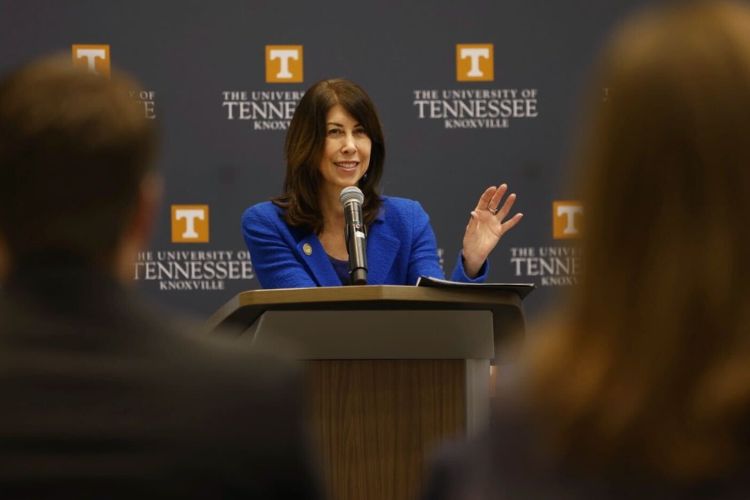National Institute of Justice Director honors Anthropology Faculty with Campus Visit

UT hosted a delegation from the National Institute of Justice (NIJ), the research and development arm of the US Department of Justice, on December 4, 2023. The event kicked off with the announcement of three new awards involving Department of Anthropology faculty and staff as principal investigators, co-principal investigators, and key personnel. The event included a panel discussion bringing together forensic scientists, law enforcement, victim’s family members, the National Missing and Unidentified Persons System (NamUs), and Bode Technology Group, moderated by Lucas Zarwell, the director of the Office of Investigative and Forensic Sciences at NIJ. During the panel, Zarwell highlighted how NIJ’s support of forensic research has led to more efficient and effective technology for the identification of missing persons.
“I’m so pleased we have partnered today to lift up this important research and engage in a panel discussion to learn from forensic scientists, law enforcement, and victim advocates about how this research is developed and used in support of NamUs specifically and in the interests of safety, equity, and justice writ large,” said Nancy La Vigne, director of the National Institute of Justice.
Following the panel, guests received a tour of the Forensic Anthropology Center (FAC) and Anthropology Research Facility, led by its director Dawnie Steadman. Steadman explained that the more than 2,000 individuals who have donated their bodies to the FAC from across the United States make this rich research possible. La Vigne underscored the importance of the research conducted at the University of Tennessee, explaining that the research efforts contribute to fundamental knowledge in forensics and “helps solve cold cases, identifies suspects, supports prosecutions, and brings justice to victims and their families.”
In addition to the long-term impact of 23 research awards totaling more than $7 million supported by NIJ, since 2010, the Department of Anthropology has supported many graduate students with Graduate Research Assistantships funded by this work.
The three recent NIJ awards include:
- A study of the impact of relic DNA on forensic microbiome applications in criminal investigations. Zach Burchan and Alison Buchan, UT Department of Microbiology, and Giovanna Vidoli, UT Department of Anthropology, are collaborating as co-Principal Investigators on this grant. Because of the ubiquity of microbes, forensic microbiome tools can aid in estimating time since death (the postmortem interval or PMI) and in trace evidence analysis. However, these microbiome-based forensic tools have a margin of error that is not well understood and that reduces the reliability and forensic science potential of the microbiome methods. Extracellular microbial DNA left over from dead cells, known as relic DNA, may contribute to this margin of error. The grant-funded research aims to improve data generation methods for forensic microbiome tools, such as PMI estimation and trace evidence analysis, through the inhibition of relic DNA.
- A study evaluating the reliability and accuracy of multiple geophysical remote sensing methods in the search for clandestine graves. Giovanna Vidoli and Mary Davis are co-Principal Investigators, collaborating with investigators Joanne Devlin and Amy Mundorff, UT Department of Anthropology, Alison Damick, the McClung Museum and the Department of Anthropology, and William Doll, UT Department of Earth & Planetary Sciences. For this research, the team will use three different geophysical methods of locating graves—ground-penetrating radar, electromagnetic conductivity, and magnetometry—under a variety of conditions, including differing terrain. Their goal is to provide hard data comparing accuracy of data from each method in varying field settings. The team will also track time efficiencies and costs associated with each method, so that individual law enforcement agencies can take those factors into account when planning and conducting a search.
- A study evaluating target enrichment for SNP genotyping of skeletal remains. Jon Davoren of Bode Technology Group is the Principal Investigator; Amy Mundorff, UT Department of Anthropology is Key Personnel. While there are well-established, validated practices for SNP Genotyping from recently deceased, fully fleshed human remains, this project seeks to validate these procedures to achieve comparable results from skeletonized remains. This is Amy Mundorff’s fourth NIJ grant with Bode Technology.